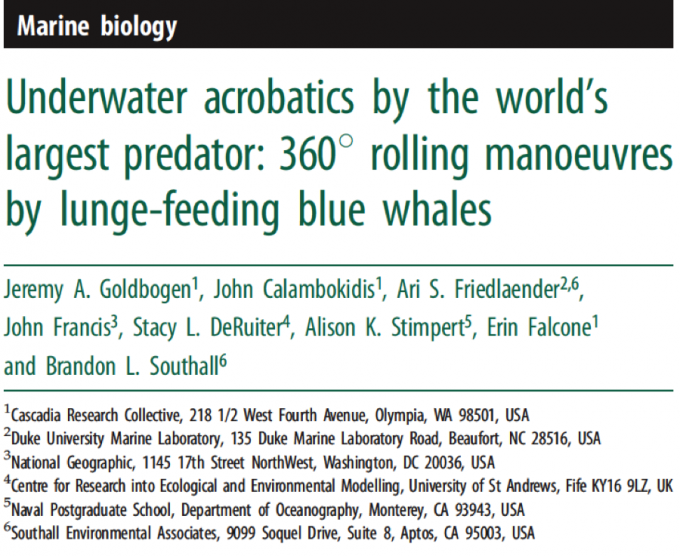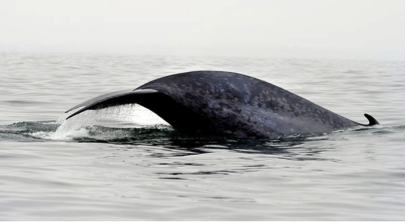We are proud to announce the publication of a new paper on blue whale feeding behavior that features tagging data collected within the Southern California Behavioral Response Study (SOCAL-BRS) project. The paper is entitled “Underwater acrobatics by the world’s largest predator: 360° rolling manoeuvres by lunge-feeding blue whales“ Dr. Jeremy Goldbogen, a post-doctoral researcher at Cascadia Research, was the lead author paper with a number of other colleagues, including partners from the SOCAL-BRS team.
You can link to the paper at: <http://rsbl.royalsocietypublishing.org/content/9/1/20120986> and to the video supplement at:
http://rsbl.royalsocietypublishing.org/content/9/1/20120986/suppl/DC1
The full citation of the paper is: Goldbogen JA, Calambokidis J, Friedlaender AS, Francis J, DeRuiter SL, Stimpert AK, Falcone E, Southall BL. 2012. Underwater acrobatics by the world’s largest predator: 360° rolling manoeuvres by lunge-feeding blue whales. Biol Lett 9:20120986. http://dx.doi.org/10.1098/rsbl.2012.0986 and the abstract of the paper is given below.

ABSTRACT: The extreme body size of blue whales requires a high-energy intake and therefore demands efficient foraging strategies. As an obligate lunge feeder on aggregations of small zooplankton, blue whales engulf a large volume of prey-laden water in a single, rapid gulp. The efficiency of this feeding mechanism is strongly dependent on the amount of prey that can be captured during each lunge, yet food resources tend to be patchily-distributed in both space and time. Here, we measured the three-dimensional kinematics and foraging behaviour of blue whales feeding on krill, using suction-cup attached multi-sensor tags. Our analyses revealed 360° rolling lunge-feeding manoeuvres that reorient the body and position the lower jaws so that a krill patch can be engulfed with the whale’s body inverted. We also recorded these rolling behaviours when whales were in a searching mode in between lunges, suggesting that this behavior also enables the whale to visually process the prey field and maximize foraging efficiency by surveying for the densest prey aggregations. These results reveal the complex manoeuvrability that is required for large rorqual whales to exploit prey patches and highlight the need to fully understand the three-dimensional interactions between predator and prey in the natural environment.
Additionally, please see the following links to some of the media coverage of these new and intriguing findings about foraging behavior in blue whales.
http://news.sciencemag.org/sciencenow/2012/11/video-rolling-in-the-deep.html
http://www.nature.com/news/blue-whales-pirouette-for-food-1.11892
http://www.nytimes.com/2012/12/04/science/acrobatic-blue-whales-can-sneak-up-on-krill.html
http://www.bbc.co.uk/nature/20509831
http://www.australiangeographic.com.au/journal/blue-whales-roll-360-degrees-to-feed-study-finds.htm
http://sciencefriday.com/segment/12/07/2012/blue-whale-barrel-roll-caught-on-camera.html
One final note is that many of the above links include photos of blue whales from the SOCAL-BRS project such as the one below. This and all other photos taken during the SOCAL-BRS project were taken under NMFS permit #14534 by different researchers (in this case Ari Friedlaender).

